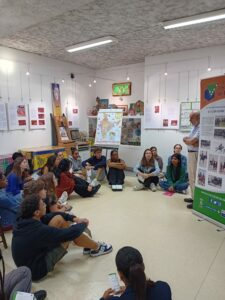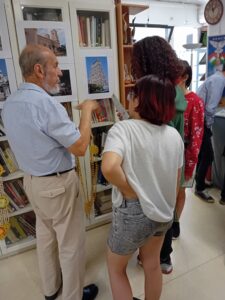Our visit to the « Comptoirs de L’Inde »
“Les Comptoirs de l’Inde” is an organisation established in November 1997. It is a Cultural and Documentation Centre about India, located in the 20th district of Paris, which contains more than 3000 books, documents, postcards, photos, stamps and family archives. This organisation presents the French history in India, more precisely the history and culture of the former Comptoirs, without forgetting the richness of Indian regional cultures: Tamil, Telugu, Bengali and Malayalam. “Les Comptoirs de l’Inde” implements various actions to highlight the cultural influence of India and the former French comptoirs of history and memory. Towards the end of 2023, as part of the nation-wide event Les Enfants du Patrimoine, my class and I visited this organisation.
Exploring India’s history and the impact of French colonialism was a rich and enlightening experience for us all, offering valuable insights of India’s colonial aspects and their enduring effects on Indian society. One particularly illuminating aspect of our visit was the opportunity to hear from guest speaker Douglas, who shared his first hand experiences as an Indian soldier serving under French rule. Douglas’s accounts provided a unique and personal perspective on the challenges and struggles faced by Indian individuals within the context of colonial domination. Through Douglas’s narrative, we gained a deeper understanding of the social, cultural, and political challenges by colonialism. His stories offered a nuanced perspective on the various impacts of the French colonialism. Furthermore, one of our classmates discovered that Douglas as an Indian soldier, had served alongside her grandfather in the army. He also knew her grandmother as they came from the same village.
As well as exploring the historical aspects of colonialism, our discussion also involved the caste system in Indian society. Learning about the role of castes educated us on the social hierarchy and culture that have shaped India’s identity and community until today. We also talked and thought about caste discrimination and social inequalities, that are still present today. The vivid descriptions of India’s landscapes, cities, and cultural traditions evoked a sense of nostalgia for me and some other Indian students but most importantly this educative experience created a sense of inspiration and curiosity for others. Overall, this exploration of India’s history and colonial imprint provided a rich learning experience and greater connection to the precious tapestry of India’s cultural heritage.
Surya, élève en Te8 Section Internationale anglais britannique





